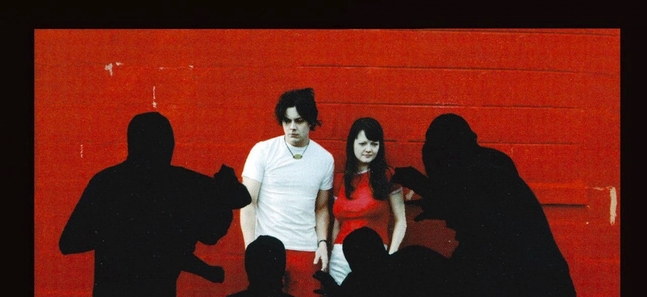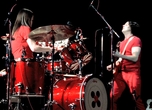Classic interview: Remembering The White Stripes, part 2
Back in 2003, Time Out scribe, Jay Ruttenberg, had Jack White for breakfast...

Posted: Thu Feb 03 2011
'This band is all about constrictions,' says Jack, his hands grasping a cigarette lighter emblazoned with a large numeral three. 'We're purposely trying not to evolve. We began looking for an entry into the blues, which I consider the very pinnacle of songwriting. The blues represents the easiest way for me to express myself...but we're two white people from Detroit! Keeping everything so primitive gave us a way in.'
While Jack acts as the band's resident Svengali, it is Meg — with her flowing pigtails and faltering beat — who embodies its minimalist spirit. Later that day, as she rests in the back of a taxi that's inching toward a Madison Avenue doctor's office, her plaster-covered arm tilted at an awkward 90 degrees, the incapacitated drummer talks of the White Stripes in the same way she does of her wrist: It's something she fell into, and now she's dealing with the consequences. (At press time, the group's tour plans were unaffected by the injury.) 'This is my first band,' says Meg, 28, uncomfortably shifting in the red togs she wears even to a doctor appointment. 'When we started, I was a bartender — the shyest bartender on the planet. Jack had a set of drums upstairs, so I began playing with him. I had no idea it would get this big. Come on! We're a two-piece blues band from Detroit.'
It is unclear whether Meg's partner, a born showman who speaks of his band with the honed polish of a politician stumping for tax cuts, shares her bewilderment. Stinking up my apartment with an omnipresent cigarette, Jack cites the pun behind the title of the duo's commercial breakthrough — White Blood Cells — which initially trickled into record stores through a small indie label, yet featured an oddly prescient cover picturing the then-unknown musicians hounded by paparazzi. 'At the time, we were starting to get attention on what we considered a big level,' he explains. 'You know, "Oh, my God, we sold a thousand records." The whole thing was a play on that. There are no straight-up blues on that album, and the idea was that the white-blood version of this music will sell more than the true, honest black version.'
White squashes his Camel into my ashtray, which prior to his visit led the happy life of a coin holder. Few contemporary musicians share his talent for embracing fame while keeping it at arm's length. 'I fight ego at all costs,' he says. 'But sometimes, in order to get anywhere, you have to embrace it. If you want to get a date, you have to be cocky picking up a girl. You can't just be fumbling about in the corner. I've always found that notion depressing, but when you go onstage, you have to jump that fence. From the get-go, we thought, Let's do this.'
With a stage director's timing, a publicist raps on the door, and White leaps from the futon as if Robert Johnson's ghost had just floated from my toilet bowl. He snags his pea coat, tugs his black cap over his ears, and is out the door and onto the street, a red-and-black stripe stomping through the white Chelsea snow.
This article originally appeared in Time Out New York, 2003
1 | 2
Tweets
- About Us |
- Work for Time Out |
- Send us info |
- Advertising |
- Mobile edition |
- Terms & Conditions |
- Privacy policy |
- Contact Us
Copyright © 2014 Time Out Tokyo











Add your comment